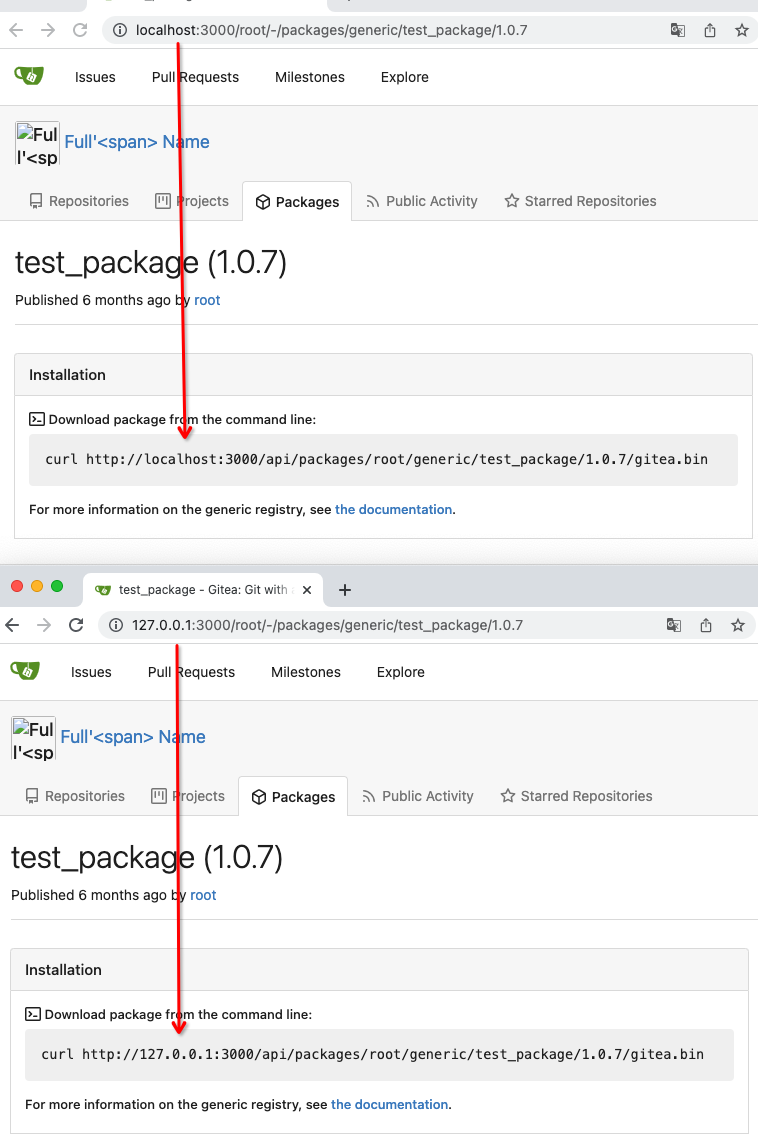Hello, it seems that one my previous PR (adding the sparse index to the
cargo package content page), did not worked as expected: the
gitea-origin-url does not add the AppURL because of the `sparse+` prefix
in the url.
Currently the rendered page gives the following:
```toml
[registry]
default = "gitea"
[registries.gitea]
index = "sparse+/api/packages/ownername/cargo/" # Sparse index
# index = "https://git.example.com/ownername/_cargo-index.git" # Git
[net]
git-fetch-with-cli = true
```
(cherry picked from commit a112cf34d3)
(cherry picked from commit 4e30c94a40)
(cherry picked from commit 72a1d0403f)
(cherry picked from commit 9c3d42f697)
(cherry picked from commit b66322a5e3)
Hello,
The current package guide for cargo gives you only the git index, with
the HTTP Index stabilized being used as default for crates.io and being
better for most use-cases.
However, it's not documented that gitea supports the sparse spec, and it
does not require the _crates-index git repo for the sparse api.
I personally think we should push users to use the sparse instead of the
git repository. (Even let users disable crates-index repos if they only
want to use sparse)
The code was just copied&pasted, it causes problems now.
There are a lot (for every package) broken translations. eg:
```
# en-US
conda.documentation = For more information on the Conda registry, see
<a target="_blank" rel="noopener noreferrer" href="%s">the documentation</a>.
# fr-FR (and many languages)
conda.documentation=Pour plus d'informations sur le registre Conda, voir
<a target="_blank" rel="noopener noreferrer" href="https://docs.gitea.io/fr-fr/packages/conda/">la documentation</a>.
```
To resolve the problem fundamentally, use a general string, and trigger
the re-translating on Crowdin side.
And, it should really really really avoid introducing too much
copied&pasted code .......
This PR follows:
* #21986
* #22831
This PR also introduce customized HTML elements, which would also help
problems like:
* #17760
* #21429
* #21440
With customized HTML elements, there won't be any load-search-replace
operations, and it can avoid page flicking (which @silverwind cares a
lot).
Browser support:
https://developer.mozilla.org/en-US/docs/Web/API/Window/customElements
# FAQ
## Why the component has the prefix?
As usual, I would strongly suggest to add prefixes for our own/private
names. The dedicated prefix will avoid conflicts in the future, and it
makes it easier to introduce various 3rd components, like GitHub's
`relative-time` component. If there is no prefix, it's impossible to
introduce another public component with the same name in the future.
## Why the `custcomp.js` is loaded before HTML body? The `index.js` is
after HTML body.
Customized components must be registered before the content loading.
Otherwise there would be still some flicking.
`custcomp.js` should have its own dependencies and should be very light,
so it won't affect the page loading time too much.
## Why use `data-url` attribute but not use the `textContent`?
According to the standard, the `connectedCallback` occurs on the
tag-opening moment. The element's children are not ready yet.
## Why not use `{{.GuessCurrentOrigin $.ctx ...}}` to let backend decide
the absolute URL?
It's difficult for backend to guess the correct protocol(scheme)
correctly with zero configuration. Generating the absolute URL from
frontend can guarantee that the URL is 100% correct -- since the user is
visiting it.
# Screenshot
<details>

</details>